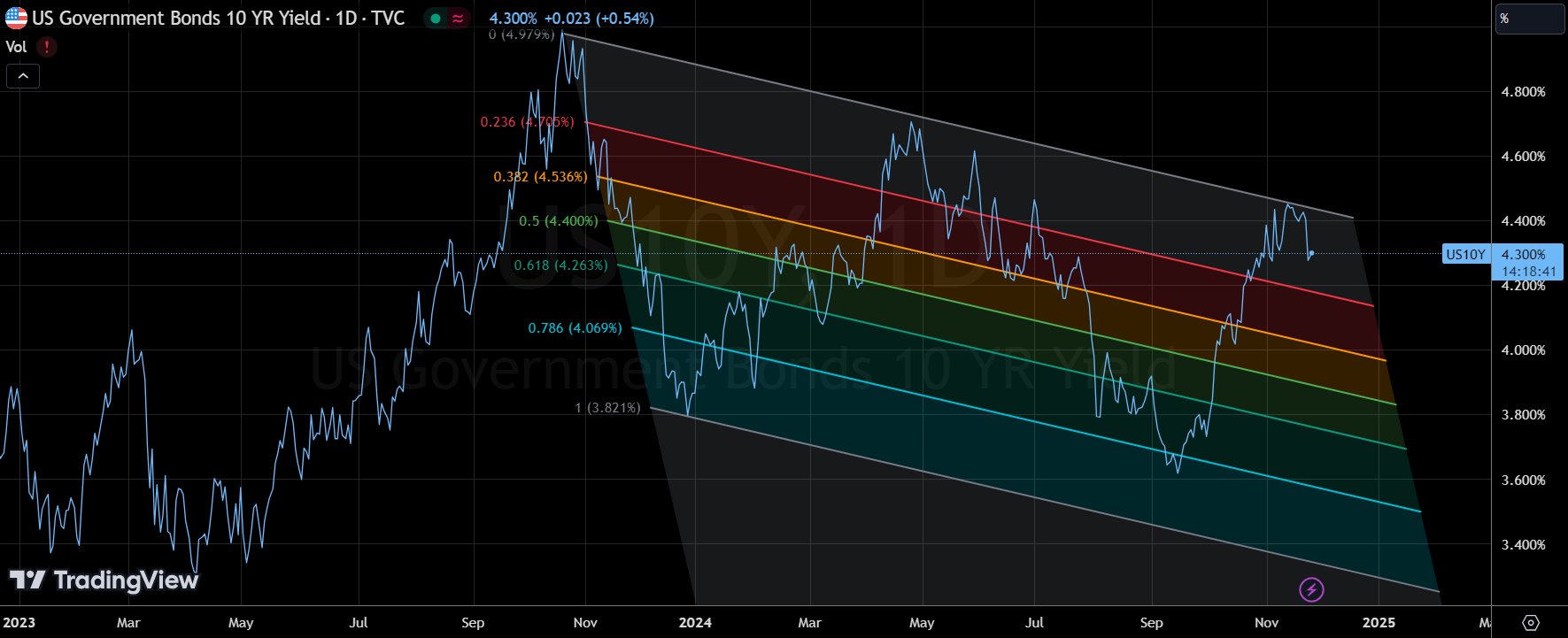How to balance porfolio in "Trump+Bessent" goverment?
The "Trump Trade" has seen a series of economic phenomena change in reverse, including a sharp rise in the price of U.S. Treasuries, a significant drop in the value of the U.S. dollar, and a reduction in small-cap stocks after they had risen.Among the reasons for these changes, Trump's nomination of Besant as U.S. Treasury Secretary has made investors less worried about Trump's trade tariff plans than they were before. $iShares 20+ Year Treasury Bond ETF(TLT)$ $US10Y(US10Y.BOND)$ $US30Y(US30Y.BOND)$ $USD Index(USDindex.FOREX)$

Trump and Bessent's policy path
Fiscal Policy.
Trump has pushed for massive tax cuts during his presidency, and Bessent, as his nominee for Treasury Secretary, has said he will continue to push for tax cuts to stimulate the economy.According to the analysis, the Trump administration may face the following fiscal challenges:
Difficulty of spending cuts: despite both Trump and Besant's emphasis on deficit reduction, there are limited actual spending cuts that can be made.Mandatory spending (e.g., Social Security and Medicare) takes up a large portion of the budget, and there is significant political resistance to cutting these expenditures.Cuts, even if implemented, are not expected to exceed $400 billion.
RISK OF DEFICIT EXPANSION: The extension of the Tax Cuts and Jobs Act (TCJA) and further reductions in tax rates could lead to an increase in the deficit of between $5.8 trillion and $7.8 trillion over the next decade.This means that the Trump administration could exacerbate the deficit problem as it pursues tax cuts.
Tariff policy
Trump has imposed high tariffs on countries such as China during his first term and is expected to continue similar measures in his second term, although the exact manner and magnitude of implementation may vary:
Ways to impose tariffs: Trump has a variety of legal tools to quickly impose tariffs, including the International Emergency Economic Powers Act (IEEPA) and Section 301 of the Trade Act.These tools allow him to act quickly without congressional approval.
Tariff Ranges and Economic Impact: while tariffs may be imposed faster than in the first term, they may not be too high due to real constraints such as the economy and inflation.For example, analysis predicts that a tariff range of 30%-40% could result in a 0.4%-0.6% decline in U.S. GDP.
Impact on Markets
Market reaction
SHORT-TERM VOLATILITY: Markets may experience short-term volatility if Trump implements high tariffs.Historically, during the trade friction in 2018, the market experienced significant declines before rebounding on the cessation of interest rate hikes and policy easing by the Federal Reserve.It is expected that the market could experience similar shocks if faced with a similar situation again in the future. $.SPX(.SPX)$ $.IXIC(.IXIC)$
INDUSTRY IMPACT: Different industries will be affected by tariffs to different degrees.Sectors that are more externally dependent, such as technology and manufacturing, will face greater pressure, while some infrastructure and consumer goods sectors are likely to be relatively stable.In addition, China's exports could be significantly impacted in the event of US tariff hikes due to China's increased dependence on external demand. $Consumer Discretionary Select Sector SPDR Fund(XLY)$ $Materials Select Sector SPDR Fund(XLB)$
Investment Recommendations
Considering the policy path and its potential impact under the Trump-Besent combination, here are some investment recommendations:
Focus on Defensive Sectors: in an environment of heightened uncertainty, investors can focus on defensive sectors such as consumer products $Consumer Staples Select Sector SPDR Fund(XLP)$ healthcare $Health Care Select Sector SPDR Fund(XLV)$ etc. These sectors are typically more robust performers in volatile economies.
Assessing tech stock risks: While tech stocks have great long-term growth potential, they are exposed to trade friction and regulatory risks, so investors should carefully assess the associated risks. $Apple(AAPL)$ $Tesla Motors(TSLA)$
FOCUS ON INFRASTRUCTURE INVESTMENT: The Trump administration is interested in promoting infrastructure development, which could create opportunities for related sectors.Investors may consider infrastructure-related companies or ETFs $John Deere(DE)$ $Industrial Select Sector SPDR Fund(XLI)$
In summary, the combination of Trump and Besant will continue to push for tax cuts and high tariff policies, which will have far-reaching implications for the U.S. economy, markets and global trade.Against this backdrop, investors need to be flexible and adjust their strategies to address potential risks and opportunities.
Disclaimer: Investing carries risk. This is not financial advice. The above content should not be regarded as an offer, recommendation, or solicitation on acquiring or disposing of any financial products, any associated discussions, comments, or posts by author or other users should not be considered as such either. It is solely for general information purpose only, which does not consider your own investment objectives, financial situations or needs. TTM assumes no responsibility or warranty for the accuracy and completeness of the information, investors should do their own research and may seek professional advice before investing.

will it be next bull market?